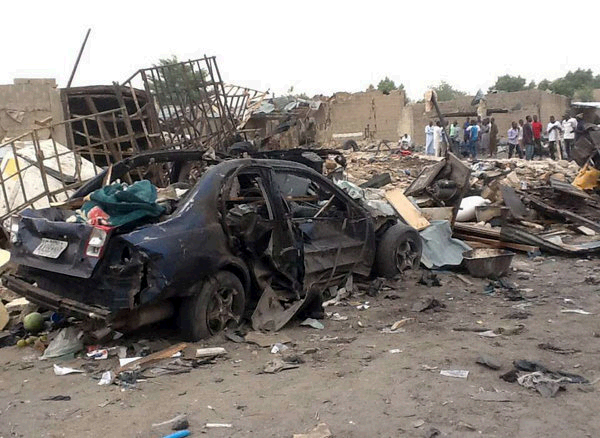Africa’s deadliest terror group, Boko Haram, is an enigma wrapped in a paradox. The enigma is that it rarely acknowledges either deeds or goals while killing hundreds of Nigerian civilians. The paradox is that even as it makes itself more feared and hated, its strength appears to increase.
And that, perhaps, explains the mystery of this band of Islamist killers, perhaps no more than a few hundred men hiding out in remote scrub and forested hills, striking in a limited area of northeastern Nigeria, and with few evident links to global jihad. More than 400 civilians have been killed in the last month alone — deaths attributed to Boko Haram, though not claimed by it.
Its goal hardly needs to be enunciated. Each new massacre of civilians — over the weekend, well over 100 were killed in car bomb blasts in Boko Haram’s birthplace, Maiduguri, and separate attacks in nearby villages; and last week, 45 boys were slaughtered at a state-run boarding school — brings new embarrassment to a Nigerian security apparatus that appears incapable of protecting the country’s citizens.
And that, in turn, undermines the Nigerian government, leaving it floundering in ineffectual expressions of sympathy for the victims, vows to redouble its engagement, and declarations of eventual victory that now have little credibility. Admittedly the military task is not an easy one, as the International Crisis Group pointed out this week, noting that the “terrain is vast and difficult,” nearly two-thirds the size of the United Kingdom, and protecting every isolated village is nearly impossible.
But that does not explain why it has often taken hours for soldiers to intervene in these unimpeded killing sprees, why headlines in the Nigerian press this week suggested that outgunned soldiers had fled in the face of the attackers, why a military post near the school — an obvious target for Islamists who hate secular education — was left apparently unmanned.
Nearly five years ago, Boko Haram declared war on Nigeria. For all that the group’s aims appear limited or mysterious, it is clearly succeeding in one essential goal: critically undermining Nigeria’s federal government. The boarding school attack seemed designed to bring maximum humiliation to President Goodluck Jonathan, occurring as it did two days before centennial celebrations in Abuja, the Nigerian capital, attended by the French president, François Hollande, and some African leaders.
Boko Haram’s attacks brutally underscore what is already obvious to all Nigerian citizens: The state does not have their backs. It is not there for them. It plays no role in protecting them or succoring them, a truism amplified a hundred times over in the course of daily life, far from the terrorist group’s killing zones.
Within them, Boko Haram kills at will. The military will often claim a “major” success, or that it has killed “dozens” of terrorists. The next day more civilians will be massacred.
“Have we ever succeeded in thwarting any of their plans?” asked Gov. Kashim Shettima of Borno State two weeks ago — the official whose state is at the heart of the insurgency, and who has the most lucid understanding of it. He pointed out what appears obvious: The Nigerian military is outgunned and outmotivated by the insurgents. Mr. Shettima’s evident sense of helplessness was perhaps not diminished by Mr. Jonathan’s threat in response, apparently half-joking, to withdraw what military protection exists in Borno.
The centennial celebrations went on last week, as did a peculiar centennial awards banquet hosted by the president in Abuja last Friday night. It seemed as though every rogue, scoundrel and genuine hero, living or dead, from Nigerian history was entitled to an award. Even brutal military dictators like the late Sani Abacha got their due.
At one point Mr. Jonathan asked for a minute of silence in memory of the boys, some as young as 13, who had been slaughtered by Boko Haram three days previously. The minute lasted for considerably less. The celebration went on, as did the encomiums to Nigeria’s greatness.

No comments:
Post a Comment